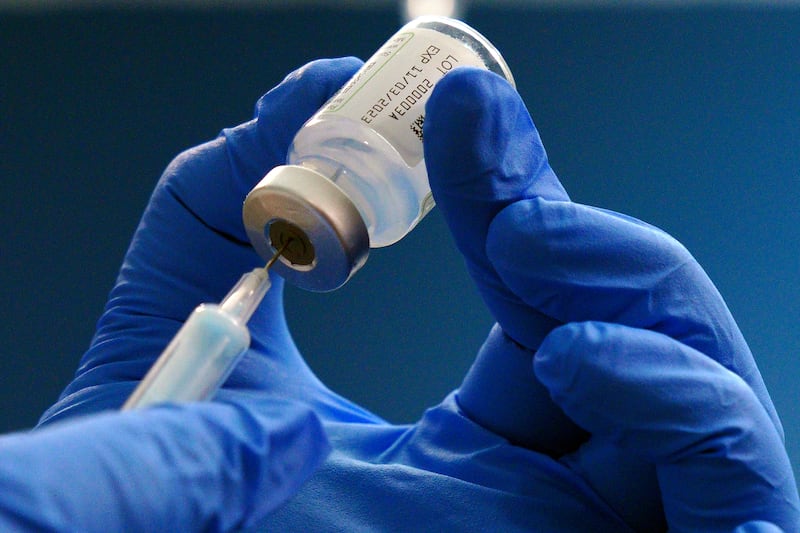The Pfizer/BioNTech Covid-19 vaccine is effective against the coronavirus variant that emerged from South Africa, according to a new study.
In a study of 20 vaccine recipients, researchers at the University of Texas Medical Branch (UTMB) at Galveston, America, found that the vaccine neutralises the virus with the N501Y and E484K mutations.
The paper comes after a separate study found that the Oxford/AstraZeneca jab was not effective at preventing mild illness caused by the more infectious South African mutation.
The findings could mean that people in Northern Ireland and Britain face needing a third jab this year amid concerns over the vaccine's effectiveness.
In the UTMB study published today, after testing the sera samples - obtained from blood - authors found evidence that the mutant viruses were neutralised - destroyed by the sera panel.
However, there was variation as neutralisation against the E484K mutation was slightly lower than neutralisation against the N501Y mutation, according to the study published in Nature Medicine.
New strains of the virus that appeared in the UK and South Africa share the same N501Y mutation.
Read more: Ministers seek to reassure over AstraZeneca coronavirus vaccine as concern about variants grows
A separate South African strain has an E484K mutation, but a number of cases have also been detected in the UK causing concern.
These mutations are located in the viral spike protein, and could potentially increase the affinity of the viral spike for the ACE2 receptor to which SARS-CoV-2 is known to bind.
Researchers say the N501Y mutation also seems to expand the range of hosts the virus can infect to include mice.
Pei-Yong Shi, from the UTMB, and Philip Dormitzer, vice president and chief scientific officer of viral vaccines at Pfizer, and colleagues engineered combinations of mutations found in these circulating variants and tested a panel of human sera from 20 participants from their previously published clinical trial of the vaccine.
The samples were obtained two or four weeks after immunisation with two doses of the vaccine three weeks apart.
Each serum was tested for neutralisation of the non-mutant strain of SARS-CoV-2 as well as the mutant viruses.
Prof Shi said: "The rapidly spreading UK and South African strains of SARS-CoV-2 have raised alarms - do the newly emerged mutations affect vaccine efficacy, therapeutic antibody potency, virus transmission, and disease severity?
"In this study, we engineered the common mutation from the new strains - N501Y in the spike protein (the viral protein responsible for attaching to and entering cells) - to SARS-CoV-2.
"As a continuous collaboration with Pfizer, we used a panel of clinical trial serum specimens to test if this single mutation affects the antibody activity against the virus induced by the vaccine.
"Our results showed this mutation alone does not compromise the vaccine's neutralising activity against the virus, which is good news for the vaccine."
The researchers say the ongoing evolution of coronavirus calls for continuous monitoring of vaccine efficacy for emerging strains.
Jonathan Ball, professor of molecular virology, University of Nottingham, said: "This is important work and provides reassurance that the antibody response generated by the Pfizer vaccine is able to neutralise Sars2 coronavirus genetically engineered to carry some of the mutations seen in the variants of concern first identified in the UK and South Africa.
"However, we suspect that the effects of these mutations can be influenced by mutations occurring in other parts of the spike protein, so it will be important to validate these promising findings using viruses engineered to carry all of the mutations found in each variant."
Read more: Ministers seek to reassure over AstraZeneca coronavirus vaccine as concern about variants grows








